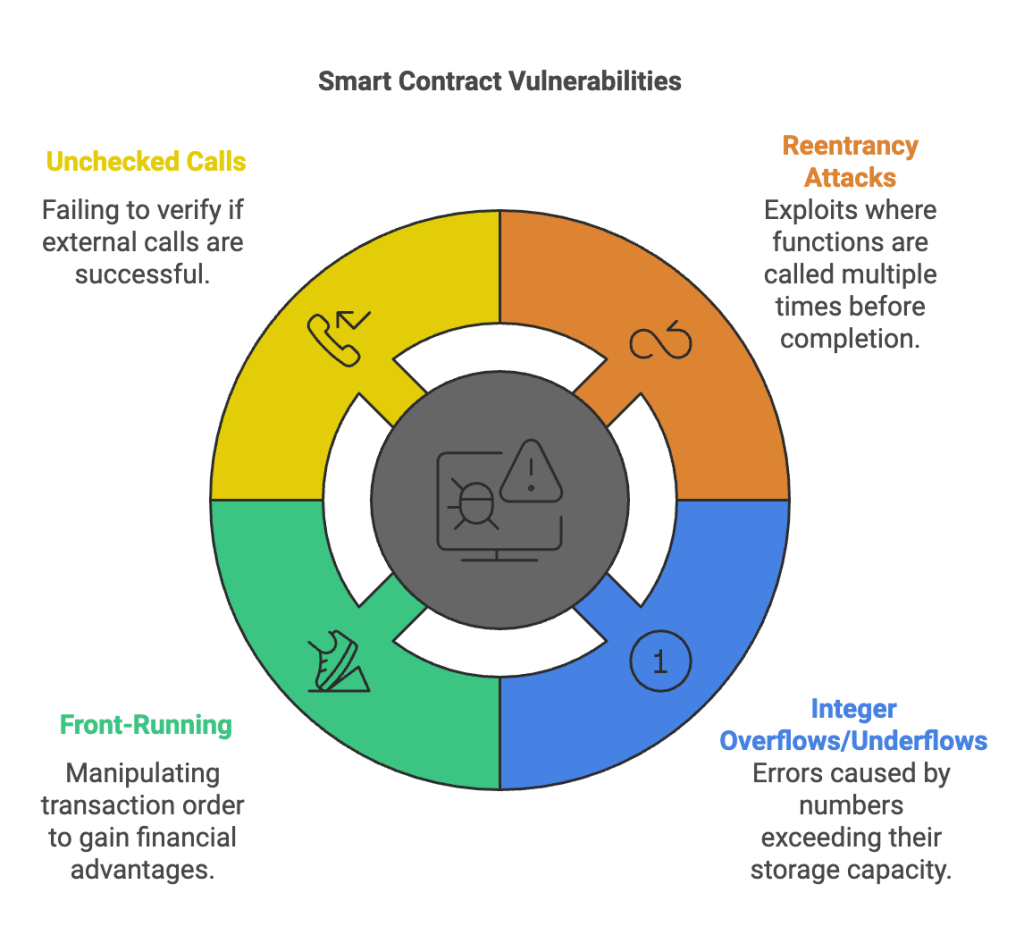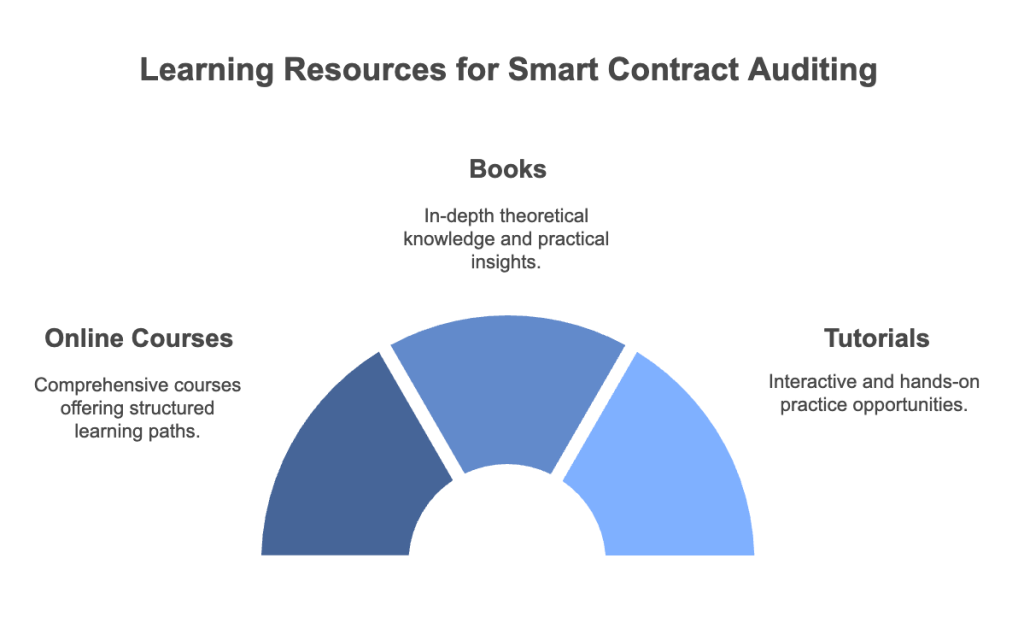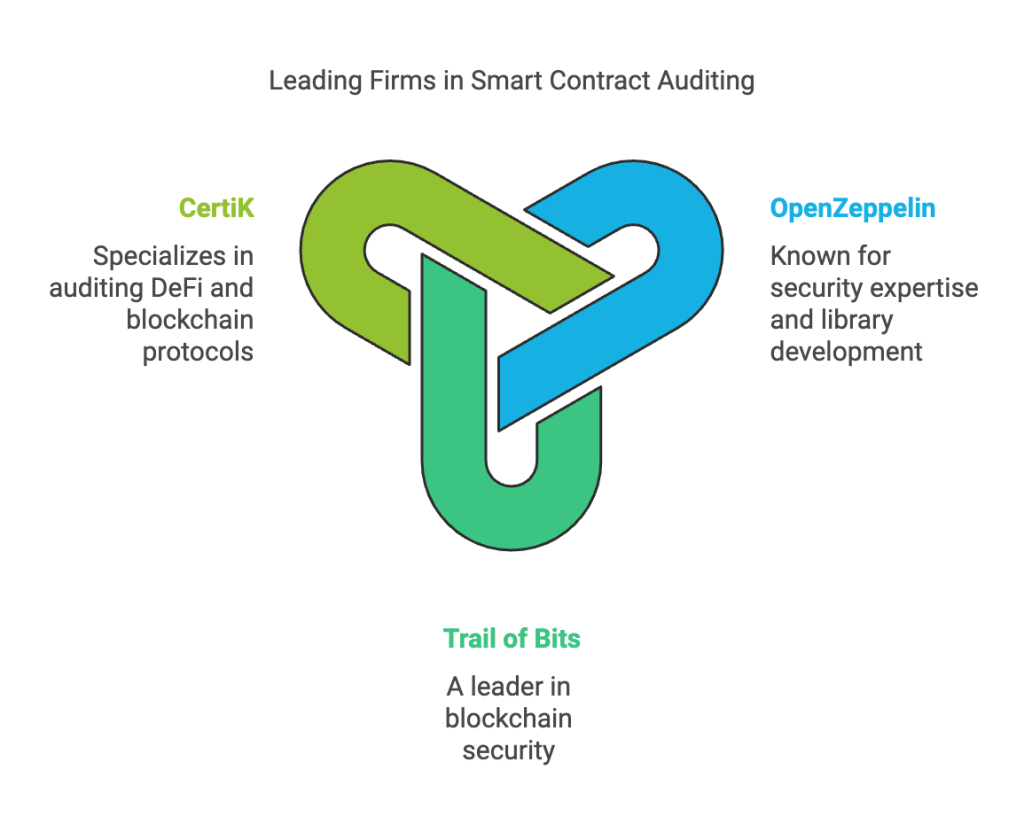How to Learn Smart Contract Security Auditing
Smart contract security auditing has become one of the most in-demand skills in the blockchain space. With millions of dollars locked in decentralized finance (DeFi) platforms and non-fungible token (NFT) marketplaces, ensuring the safety of smart contracts is critical. Learning to audit smart contracts can open up lucrative opportunities for developers and blockchain enthusiasts in this booming field.
Suppose you’re ready to dive into smart contract security auditing. In that case, this guide will provide a roadmap to get you started, including the key skills you need, tools to master, and resources to accelerate your learning.
What Is Smart Contract Security Auditing?
Smart contract security auditing reviews a smart contract’s code to identify vulnerabilities, inefficiencies, and potential exploits. These audits ensure that contracts function as intended and safeguard user funds from potential attacks. Given the irreversible nature of blockchain transactions, even small errors can lead to significant financial losses.
Skills Needed for Smart Contract Security Auditing
You’ll need technical expertise and analytical skills to excel in smart contract auditing. Here’s what to focus on:
1. Understanding Blockchain Basics
Start by understanding how blockchain technology works, especially platforms like Ethereum, where most smart contracts are deployed. Learn about:
- Consensus mechanisms (Proof of Work, Proof of Stake).
- Ethereum Virtual Machine (EVM).
- Transaction lifecycle and gas mechanics.
2. Proficiency in Smart Contract Languages
Most smart contracts are written in Solidity, Ethereum’s primary programming language. Mastering Solidity is a must, but familiarity with other languages like Rust (used in Solana) and Vyper (an alternative to Solidity) is also valuable.
3. Familiarity with Common Vulnerabilities
Learn to identify common vulnerabilities found in smart contracts. Some of the most well-known include:
- Reentrancy attacks: Exploits where functions are called multiple times before the initial execution is complete.
- Integer overflows/underflows: Errors caused by numbers exceeding their storage capacity.
- Front-running: Manipulating transactions to gain financial advantages.
- Unchecked calls: Failing to verify if external calls are successful.

4. Analytical Thinking
Auditing is not just about coding; it’s about thinking critically. You’ll need to anticipate how malicious actors might exploit a contract and understand the logic behind its design.
5. Familiarity with Testing Frameworks
Testing is a significant part of auditing. Learn to use frameworks like:
- Hardhat: A development environment for Ethereum smart contracts.
- Truffle: A popular framework for building, testing, and deploying contracts.
- Foundry: A newer tool gaining traction for its speed and developer-friendly features.
Essential Tools for Smart Contract Security Auditing
Familiarizing yourself with auditing tools will give you a strong foundation. Here are some of the most widely used:
1. Static Analysis Tools
- MythX: A cloud-based security analysis platform for Ethereum smart contracts.
- Slither: A static analysis tool that identifies vulnerabilities in Solidity contracts.
- Securify: An automated analyzer that detects security issues.

2. Dynamic Analysis Tools
- Echidna: A property-based testing tool that helps verify smart contract behavior.
- Manticore: A symbolic execution tool to detect edge-case vulnerabilities.
3. Code Review Tools
- Remix IDE: Useful for small-scale projects and quick audits.
- VS Code with Solidity Extensions: A robust setup for reviewing complex contracts.
4. Block Explorers
- Etherscan: Analyze deployed smart contracts, transactions, and events.
- Tenderly: Provides an intuitive interface for debugging and simulating contract interactions.
How to Get Started
- Learn the Basics of Blockchain and Smart Contracts
If you’re new to blockchain, start with beginner-friendly courses or books:
- “Ethereum and Solidity: The Complete Developer’s Guide” on Udemy.
- “Mastering Ethereum” by Andreas M. Antonopoulos.
- Free tutorials on CryptoZombies for hands-on Solidity practice.

2. Understand Security Fundamentals
Security is the cornerstone of auditing. Study blockchain-specific security principles and stay updated on the latest hacks to understand how they happen. Great resources include:
- ConsenSys’ Smart Contract Best Practices: A thorough guide to writing secure contracts.
- OpenZeppelin’s Documentation: Trusted standards and libraries for secure contract development.
3. Experiment with Real Contracts
Download smart contracts from platforms like Etherscan or GitHub, and practice auditing them. Focus on spotting vulnerabilities and testing fixes.
4. Join Security Communities
Collaborating with others is a great way to learn. Join forums, Discord channels, or Telegram groups like:
- r/ethereum and r/ethdev on Reddit.
- Smart Contract Auditors on Telegram.
- OpenZeppelin Community.
5. Contribute to Open Source Projects
Open source is a fantastic place to start. Platforms like GitHub have open-source projects where you can contribute by auditing or improving smart contracts.
Best Courses for Learning Smart Contract Auditing
To accelerate your learning, enroll in specialized courses:
- Certified Blockchain Security Professional (CBSP): A certification program that covers smart contract auditing in detail.
- ConsenSys Academy’s Smart Contract Security Course: Designed by blockchain leaders, this course deepens into Solidity and contract security.
- Blockchain Security Alliance: Offers beginner to advanced courses on blockchain vulnerabilities and auditing tools.
- Trail of Bits Workshops: Interactive sessions from one of the leading blockchain security firms.

Landing Your First Auditing Gig
Once you’ve gained the skills, here’s how to find work in smart contract auditing:
1. Build a Portfolio
Create a portfolio showcasing your work. Include detailed reports of contracts you’ve audited, highlighting vulnerabilities found and fixed.
2. Freelancing Platforms
Websites like Upwork, Freelancer, and CryptoJobs often list smart contract auditing gigs.
3. Apply to Blockchain Companies
Look for roles at companies like:
- OpenZeppelin: Renowned for its security expertise and library development.
- Trail of Bits: A leader in blockchain security.
- CertiK: Specializes in auditing DeFi and blockchain protocols.
4. Participate in Bug Bounty Programs
Platforms like Immunefi and HackerOne host blockchain-specific bug bounties, allowing you to earn rewards while honing your skills.

The Path to Becoming a Pro
Mastering smart contract security auditing requires patience, practice, and a thirst for knowledge. Stay curious, keep learning, and immerse yourself in the blockchain space. Building your skills and connecting with the right opportunities will make you a sought-after smart contract security auditor in no time.




